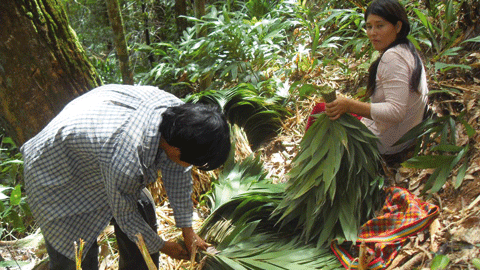Conservation policies threaten survival of indigenous people
Conservation policies make difficult the access to forest resources such as hunting and wild plant gathering. An ICTA-UAB study recommends implementing conservation policies which take into account indigenous societies, their culture and the changes they are facing.

However, tropical forest conservation policies which have been long put in place so as to hinder human use makes it difficult for contemporary indigenous peoples to access basic resources. This is what emerges from a study by scientists at the Institute of Environmental Science and Technology of the Universitat Autònoma de Barcelona (ICTA-UAB) led by Dr Victoria Reyes-García, in the framework of a research project on current biodiversity conservation policies, their impact on contemporary indigenous societies, and the cultural and economic changes threatening their tight relation with the environment and which can endanger the success of diversity conservation. The research was based on the analysis of three indigenous societies in Borneo, the Congo Basin and Amazonia.
The project, with one million Euros in funding through a Starting Grant awarded by the European Research Council (within the Seventh Framework Programme of the European Union) to Victoria Reyes-García, has carried out an in-depth study of these three indigenous societies over five years, in order to gain greater insights into their systems of knowledge, which are often forgotten.
“Tropical forest conservation policies not only hinder the use of forest resources with commercial goals such as logging, but also subsistence uses of local communities, including the uses by indigenous peoples who have managed these forest for millennia”, explains Dr Victoria Reyes-García, who says that local communities may indeed be the best guardians of biodiversity-rich areas, as they depend on them for subsistence.
Despite their high reliance on forest resources, the research states that indigenous peoples tend to use tropical forests in a diffuse way, with many areas seldom used. The low demographic pressure of local communities also contributes to a weak and low intensity impact on forest ecosystems.
The members of the research group lived for a year and a half in the communities of the Punan Tubu (hunter-gatherers of Borneo, Indonesia), the Baka (semi-nomads from the River Congo basin) and the Tsimane' (forager-horticulturalists from Bolivian Amazonia). Using a GPS device, they monitored the communities in order to collect information related to their daily forest visits, the most frequented areas, and the time spent in each area. The researchers quantified the impacts of their activities. Hunting and wild plant gathering, both for eating and for housing construction and household goods (rattan and palm trees, for example), as well as for trade, are the main activities carried out in the forest.
The research shows that indigenous peoples face internal and external pressures which affect the way in which they use the forest. These cultural and economic changes threaten their tight relation with the environment. Researchers point out that shifts related to contact with other ways of life through access to school and modern healthcare, learning the national language and integration into the market economy result in changes in beliefs, perception and in biodiversity, probably through changes in forest uses. Also, younger generations tend to underestimate how much change an ecosystem has undergone, due to an intergenerational lack of communication and knowledge transmission. “Younger generations do not perceive the changes in the ecosystem because as intergenerational communication decreases, the references on how ecosystems resembled in the past are lost”, says Victoria Reyes- García, who explains that the development of a regional and national market of forest products such as bushmeat has created new incentives for hunting and for the adoption of more efficient, but unsustainable, hunting practices.
In conclusion, researchers recommend the implementation of new biodiversity conservation policies that replace the current “strictly biological” focus by a “biocultural” approach that takes into account the indigenous societies and their livelihood needs. New tropical forest conservation policies should incorporate local culture and knowledge, and promote intergenerational transfer, while considering the dynamism of knowledge systems and the challenges they face.
On completing this project (The Adaptive Nature of Culture: A cross-cultural analysis of the returns of Local Environ-mental Knowledge in three indigenous societies"), the group issued a comprehensive report with the principal conclusions drawn in Spanish, English and French.